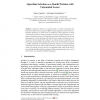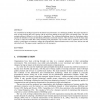83 search results - page 1 / 17 » Psychological models of human and optimal performance in ban... |
COGSR
2011
13 years 2 months ago
2011
In bandit problems, a decision-maker must choose between a set of alternatives, each of which has a fixed but unknown rate of reward, to maximize their total number of rewards ov...
ECML
2005
Springer
14 years 29 days ago
2005
Springer
The multi-armed bandit problem for a gambler is to decide which arm of a K-slot machine to pull to maximize his total reward in a series of trials. Many real-world learning and opt...
LION
2010
Springer
13 years 11 months ago
2010
Springer
Abstract. Algorithm selection is typically based on models of algorithm performance learned during a separate offline training sequence, which can be prohibitively expensive. In r...
NIPS
2008
13 years 8 months ago
2008
We use graphical models and structure learning to explore how people learn policies in sequential decision making tasks. Studies of sequential decision-making in humans frequently...
IADIS
2003
13 years 8 months ago
2003
The contribution of intelligent agents for the human team performance is a challenging problem. This paper introduces a study to help clarifying this issue, starting with the moti...


